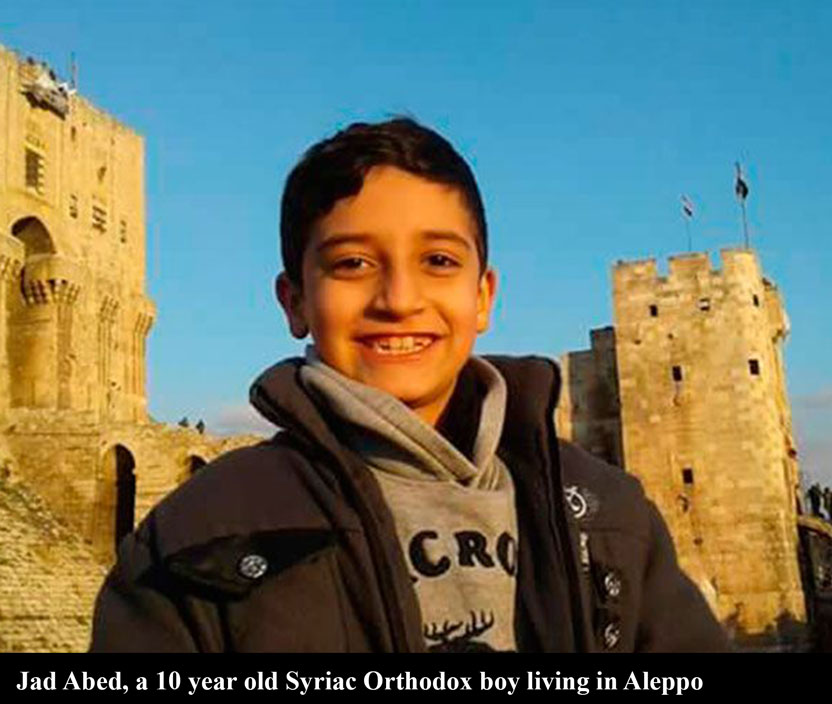SYRIA
Wartime in Aleppo: ‘many days it was like living in a movie’
Jad Abed is a 10-year-old Syriac Orthodox boy living in Aleppo, Syria. He is in fifth grade. In this interview, he reflects on his life in the city that saw some of the most intense fightings in his country’s civil war. Though normal life is slowly resuming, for Jad the pain of suffering and deprivation endures.
The Pontifical Foundation ACN accompanies Christians in Syria from the beginning of the crisis, trying to alleviate their suffering and their need. Some of the projects that Jad Abed mentions in his narration—such as Christmas aid, food packages, scholarships or the reconstruction of the sports club—are initiatives that ACN supports thanks to donations from benefactors in many countries around the world.
“Nowadays, I go to a new school because my old one was destroyed in the bombing. We moved to another location, and it certainly is not like our first school, for it is an underground facility lacking heat and power. However, with the help of those who look after us, we made it through the cold weather and were able to feel warmth to a certain extent, and the power returned to light up our school and homes.
“I love basketball. It is my favourite sport, and I am a member of the Al Jalaa Sports Club, where I play all the time and have earned many medals. I wish to represent my country in international games, and I really want Syria to participate in international games.
“What’s beautiful is that sports and music did not stop throughout the war. I love music as well. I think that the bad people do not sing, and that is why music has been so important throughout the war.
“I have two older brothers, both of whom have gone abroad, the first as an immigrant to Canada, and the second is waiting in Lebanon for his papers so that he can go to Europe. Now, my mother, my father and I are living together, hoping for their return.
“Honestly, I feel that Europe has stolen from us friends and loved ones; has robbed us of the sight of them. Yet, my faith is great, and I feel that all will return, even after many years have gone by.
“I also lost a close friend who died in a bombing; he was waiting for the school bus. Now we have an intercessor in heaven who will tell God about what is happening to us.
“Our home has also had its share of bombings. I remember the sound of the bombs getting nearer, and as one of them hit the roof, a part of it collapsed; my dad got us out at right away, then drove us to the place where we are still living today. We cannot go back home, for a large part of it has been destroyed. I wish that my toys weren’t damaged. At our old home, there were many pictures and memories that we could not get out—things that the fire of war has eaten.
“We have endured many days that were like living in a movie. One Christmas, we were under siege and the markets were half empty. I remember that we could not find any bread. One day, we heard the sound of a whistle at night in our street. They were calling people down from their homes. My siblings and I were terrified.
“However, soon we realized that they came with cars full of bread, with a ration for each home. It was one of the hardest Christmases. However, I remember really well that the Church helped us, provided us with clothes, and gave candy to the children. In fact, all the children got to pick out seven pieces of clothing, according to their taste.
“Our Church has played an effective role in the past years. My dad collects a package of supplies from the Church each month, and students receive a monthly stipend to cover their school fees.
The Church always answers our questions, especially in tough conditions. I have started to ask some difficult questions related to God; asking if He really exists; whether He is satisfied with what is happening to us; why He has chosen us to live in such times of conflict; what His message is; whether He really is with us and if He really loves us.
“The Church answers all these questions in Sunday school, and, in addition, through some meaningful activities and games that introduce us to the Word of God—showing us how much He loves us.
I thank you for giving me the chance to speak out. They normally do interviews with adults, not children. However, children always have plenty to tell.
In the end, I ask all who read this article to pray for us; to pray for the children of Syria who were allowed to live their childhood. We ask the Lord to grant us peace and happiness and to fill all our hearts so that we can heal our wounds, and return to our normal life as soon as possible.
Nagham Koudsiah – ACN -US





